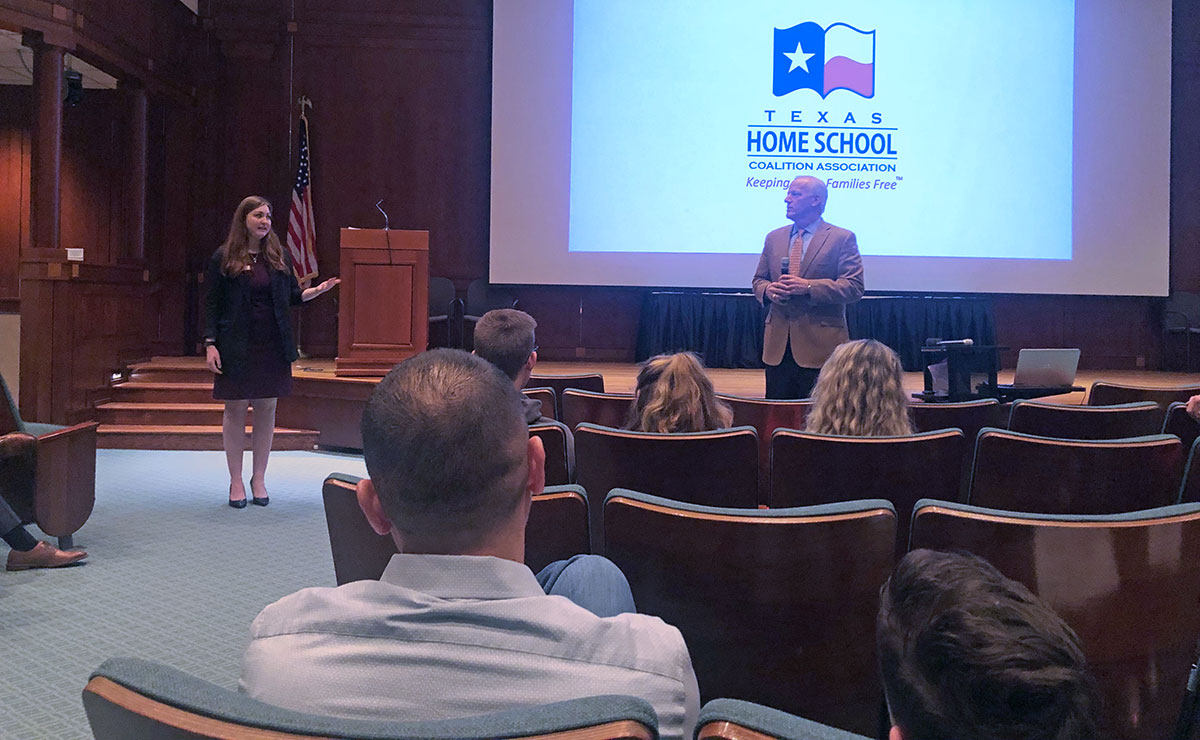Here is an overview of everything about getting started homeschooling in Texas! You’ll be an expert after reading this article and gain a wealth of knowledge on Texas homeschool information!
Here’s the facts on how to homeschool in Texas.
What’s the law?
Texas is one of the best places to homeschool.
By best, we mean that Texans who homeschool don’t have to jump through the hoops that some other states require—like taking yearly standardized testing, having parents evaluated by the state and getting specific curriculum approved.
The only things that the Texas law requires to legally homeschool are that:
- The instruction must be bona fide (i.e. not a sham);
- The curriculum must be in visual form (e.g. books, workbooks, video monitor);
- The curriculum must include the basic subjects of
- reading
- spelling
- grammar
- mathematics
- and good citizenship.
Your child may also be taught in another family’s home or you may use a tutor for instruction.
Find out more if you’re interested in the background of homeschool laws of Texas.

What if my child is already enrolled in public school?
If your child is already enrolled in public school or has gone to public school in the past, you’ll need to withdraw so that you don’t encounter any issues with truancy. You are not required to register with or receive permission from your local district to homeschool. You simply withdraw. We have the forms you need and will be happy to walk through it with you!
The Texas Education Agency (TEA) requires you to specify the date that you will begin homeschooling in order to withdraw your child from public school. After beginning, THSC also has tools to help you keep attendance records if you’d like, but they are not required in Texas.
It’s important you withdraw your students before keeping them home and that homeschooling begins the following school day after withdrawing from public school. This prevents the school from counting them absent prior to withdrawal and from potentially filing truancy charges.
What if I want to re-enroll in public school after homeschooling?
Each school district sets the requirements for re-entry into their schools. This is a local decision—not one made by the state of Texas. So requirements vary.
Review your school’s re-enrollment policies if you think you might enroll in public school again after homeschooling.
Do I have to register with anyone if my child’s never attended public school?
No. If your child has never been enrolled in public school, simply begin homeschooling. You are not required to register with or receive permission from your local school district to homeschool.
If your child has never gone to public school, start whenever you want, even today! You’re your own boss.
Sounds great! How do I get started?
First: join THSC. You can’t afford not to. Member benefits include:
- Public School Withdrawal Support: We’ll walk you through the steps of withdrawing your kids from public school. If you run into any trouble, we’ll work with the school.
- Homeschool Starter Kit: Test drive six weeks of ready-made lesson plans and curriculum.
- Planning Tools: Schedules, report cards, transcript templates, student and teacher ID cards, term average templates, customizable diplomas and more.
- Expert Homeschool Coaches: Experienced homeschool staff available to support you by phone or online with getting started, choosing curriculum, teaching special needs and more.
- $600+ in Discounts: Exclusive benefits and special offers like 20% off Alpha Omega K-12 curriculum, three months free of SchoolhouseTeachers.com and more.
- Legal Protection: Consultation and advocacy on homeschool issues with school districts, custody issues and CPS.
- Attorney Hotline: Talk to a qualified attorney.
- Member Advocacy: Intervention and support on discrimination issues with college admission, government agencies, testing and more.
Second: find a curriculum that works for your family. One of the beauties of homeschooling is that you can do some research and find exactly what fits your child’s learning style so that they can thrive! You are also not limited to one grade level: pick and choose what’s best.
For instance, if your child is a math whiz but struggles in language arts, bump them up a grade level in math and let her fly as high as she wants to while buckling down in language arts with her.
You can also delve into the world of dual credit and help your child get high school or college credit for their work! There are paid online school options like Monarch or even free online options like Easy Peasy All-In-One Homeschool!
Here are some more resources on homeschooling curriculum to learn different homeschool methods. One of the best parts of being a homeschooler is that you are not tied to one option!
You have the freedom to choose between the learning styles of visual, auditory and kinesthetic.
There are as many distinct homeschooling styles as there are homeschool families and in Texas, you have the freedom to do what suits you and your family best!
Is curriculum accredited or unaccredited?
Schools are accredited, while curriculum is typically not accredited. To be accredited, a school must meet certain standards established by the state.
What’s the difference between homeschool and school at home?
If your student is homeschooled, you as the parent direct your child’s education. You may choose to teach your child yourself or to contract with a private tutor or join a co-op class/college class to support your child’s education. But you are ultimately in charge and get to decide the curriculum, the schedule and whether your child advances to the next grade.
If you do public school at home (a program like TTU K-12 or courses provided by your school district), your child is still enrolled in public school. The school directs their education. They must follow the school’s curriculum, direction and must be present in class for a set amount of hours each day and days each year.
What in the world does Good Citizenship mean?
One of the requirements of homeschooling in Texas is to make sure that you teach good citizenship. Good citizenship is exactly what it sounds like: teaching students to be good citizens.
For younger children, that might look like celebrating federal holidays and learning the Pledge of Allegiance. For older students, subjects like history and government meet the requirement.
THSC members can take advantage of the free homeschool government curriculum for older students.
There is no homeschool standardized assessment in Texas for this requirement.
Looking for good citizenship lesson plans? Check homeschool curriculum for Texas off your list as a THSC member! When you join THSC, you can download the “Lone Star Study” guide. Using this to teach your students is another way to fulfill the good citizenship requirement in Texas state law!
Is your student 16 or older? Consider becoming a THSC PAC volunteer. The THSC Political Action Committee (PAC) Team acts as a watchdog against questionable politicians and creates homeschool legal policy.
This can count toward high school credit and looks fantastic on a resume!
How can I connect with other homeschoolers?
So glad you asked! Amazingly, even though kids in school are often told to “stop socializing,” people often assume that public school is the best place for getting “socialized.”
Read more about the myth of under-socialized homeschoolers here.
Find a homeschool support group in your area to:
- Build friendships for you and your children
- Share encouragement and ideas
- Experience activities such as field trips, sporting events, play groups, etc.
- Do co-op classes to help share and expand learning opportunities for students
- Join a THSC partner group and your group leader can share a discount code for $20 off your THSC membership.
There is no limit to what homeschoolers can do together! Generally, homeschooled students learn to socialize more effectively since they interact with all ages instead of just with other students in their grades.
There could be 20 or more homeschool groups in Texas per county ranging from hobbies to dances, sports to spelling bees, co-ops, science fairs and educational courses. These groups meet regularly and the kids have a wonderful opportunity to bond with other children whose families share the same goals and values.
Homeschool students also don’t have to deal with bullying, peer pressures and other toxic personalities for eight hours a day, giving them strong self-confidence.
How do homeschool kids graduate?
THSC can help you navigate the high school years to make sure that you are confident that your child has mastered all homeschool graduation requirements.
You may wonder, “How does my child get a diploma?” The simple answer is: “You give them one.” But for the longer, more detailed answer:
As a parent, you can graduate homeschool students. Because homeschools are considered a type of private schools in Texas, the administrators of a homeschool (the parents) have the ability to determine requirements for graduation, just like private schools.
When your child has completed what you determine to be your school’s requirements for graduation, they may graduate and you award a diploma. THSC members have access to a free high school diploma template.
Your homeschool group or co-op might have a graduation ceremony that you can take part in, or you can let your creativity loose and celebrate your child’s achievements in an extra special way!
And there you go! Consider yourself a homeschooling expert!
THSC is here to help you in any step of the way as you start on your homeschooling journey.
Now all you have to do is jump in and start!
Know that you are not alone. Staying connected with other homeschoolers will provide information, support and encouragement during difficult times.
THSC believes that homeschooling is one of the best models for educating children. We are here to support you in the vital work of raising and educating the next generation of leaders.
Jessica Lovett
Jessica Lovett is passionate about homeschooling her own kids, sci-fi books, quirky coffee shops, and her scruffy black dog, Bofur. In her spare time, she loves playing the piano and also singing on her church’s worship team. Her writing can be seen on ChristianAnswers.net and her novel Transplanting Hope is available wherever books are sold.
Here is an overview of everything about getting started homeschooling in Texas! You’ll be an expert after reading this article and gain a wealth of knowledge on Texas homeschool information!
Here’s the facts on how to homeschool in Texas.
What’s the law?
Texas is one of the best places to homeschool.
By best, we mean that Texans who homeschool don’t have to jump through the hoops that some other states require—like taking yearly standardized testing, having parents evaluated by the state and getting specific curriculum approved.
The only things that the Texas law requires to legally homeschool are that:
- The instruction must be bona fide (i.e. not a sham);
- The curriculum must be in visual form (e.g. books, workbooks, video monitor);
- The curriculum must include the basic subjects of
- reading
- spelling
- grammar
- mathematics
- and good citizenship.
Your child may also be taught in another family’s home or you may use a tutor for instruction.
Find out more if you’re interested in the background of homeschool laws of Texas.

What if my child is already enrolled in public school?
If your child is already enrolled in public school or has gone to public school in the past, you’ll need to withdraw so that you don’t encounter any issues with truancy. You are not required to register with or receive permission from your local district to homeschool. You simply withdraw. We have the forms you need and will be happy to walk through it with you!
The Texas Education Agency (TEA) requires you to specify the date that you will begin homeschooling in order to withdraw your child from public school. After beginning, THSC also has tools to help you keep attendance records if you’d like, but they are not required in Texas.
It’s important you withdraw your students before keeping them home and that homeschooling begins the following school day after withdrawing from public school. This prevents the school from counting them absent prior to withdrawal and from potentially filing truancy charges.
What if I want to re-enroll in public school after homeschooling?
Each school district sets the requirements for re-entry into their schools. This is a local decision—not one made by the state of Texas. So requirements vary.
Review your school’s re-enrollment policies if you think you might enroll in public school again after homeschooling.
Do I have to register with anyone if my child’s never attended public school?
No. If your child has never been enrolled in public school, simply begin homeschooling. You are not required to register with or receive permission from your local school district to homeschool.
If your child has never gone to public school, start whenever you want, even today! You’re your own boss.
Sounds great! How do I get started?
First: join THSC. You can’t afford not to. Member benefits include:
- Public School Withdrawal Support: We’ll walk you through the steps of withdrawing your kids from public school. If you run into any trouble, we’ll work with the school.
- Homeschool Starter Kit: Test drive six weeks of ready-made lesson plans and curriculum.
- Planning Tools: Schedules, report cards, transcript templates, student and teacher ID cards, term average templates, customizable diplomas and more.
- Expert Homeschool Coaches: Experienced homeschool staff available to support you by phone or online with getting started, choosing curriculum, teaching special needs and more.
- $600+ in Discounts: Exclusive benefits and special offers like 20% off Alpha Omega K-12 curriculum, three months free of SchoolhouseTeachers.com and more.
- Legal Protection: Consultation and advocacy on homeschool issues with school districts, custody issues and CPS.
- Attorney Hotline: Talk to a qualified attorney.
- Member Advocacy: Intervention and support on discrimination issues with college admission, government agencies, testing and more.
Second: find a curriculum that works for your family. One of the beauties of homeschooling is that you can do some research and find exactly what fits your child’s learning style so that they can thrive! You are also not limited to one grade level: pick and choose what’s best.
For instance, if your child is a math whiz but struggles in language arts, bump them up a grade level in math and let her fly as high as she wants to while buckling down in language arts with her.
You can also delve into the world of dual credit and help your child get high school or college credit for their work! There are paid online school options like Monarch or even free online options like Easy Peasy All-In-One Homeschool!
Here are some more resources on homeschooling curriculum to learn different homeschool methods. One of the best parts of being a homeschooler is that you are not tied to one option!
You have the freedom to choose between the learning styles of visual, auditory and kinesthetic.
There are as many distinct homeschooling styles as there are homeschool families and in Texas, you have the freedom to do what suits you and your family best!
Is curriculum accredited or unaccredited?
Schools are accredited, while curriculum is typically not accredited. To be accredited, a school must meet certain standards established by the state.
What’s the difference between homeschool and school at home?
If your student is homeschooled, you as the parent direct your child’s education. You may choose to teach your child yourself or to contract with a private tutor or join a co-op class/college class to support your child’s education. But you are ultimately in charge and get to decide the curriculum, the schedule and whether your child advances to the next grade.
If you do public school at home (a program like TTU K-12 or courses provided by your school district), your child is still enrolled in public school. The school directs their education. They must follow the school’s curriculum, direction and must be present in class for a set amount of hours each day and days each year.
What in the world does Good Citizenship mean?
One of the requirements of homeschooling in Texas is to make sure that you teach good citizenship. Good citizenship is exactly what it sounds like: teaching students to be good citizens.
For younger children, that might look like celebrating federal holidays and learning the Pledge of Allegiance. For older students, subjects like history and government meet the requirement.
THSC members can take advantage of the free homeschool government curriculum for older students.
There is no homeschool standardized assessment in Texas for this requirement.
Looking for good citizenship lesson plans? Check homeschool curriculum for Texas off your list as a THSC member! When you join THSC, you can download the “Lone Star Study” guide. Using this to teach your students is another way to fulfill the good citizenship requirement in Texas state law!
Is your student 16 or older? Consider becoming a THSC PAC volunteer. The THSC Political Action Committee (PAC) Team acts as a watchdog against questionable politicians and creates homeschool legal policy.
This can count toward high school credit and looks fantastic on a resume!
How can I connect with other homeschoolers?
So glad you asked! Amazingly, even though kids in school are often told to “stop socializing,” people often assume that public school is the best place for getting “socialized.”
Read more about the myth of under-socialized homeschoolers here.
Find a homeschool support group in your area to:
- Build friendships for you and your children
- Share encouragement and ideas
- Experience activities such as field trips, sporting events, play groups, etc.
- Do co-op classes to help share and expand learning opportunities for students
- Join a THSC partner group and your group leader can share a discount code for $20 off your THSC membership.
There is no limit to what homeschoolers can do together! Generally, homeschooled students learn to socialize more effectively since they interact with all ages instead of just with other students in their grades.
There could be 20 or more homeschool groups in Texas per county ranging from hobbies to dances, sports to spelling bees, co-ops, science fairs and educational courses. These groups meet regularly and the kids have a wonderful opportunity to bond with other children whose families share the same goals and values.
Homeschool students also don’t have to deal with bullying, peer pressures and other toxic personalities for eight hours a day, giving them strong self-confidence.
How do homeschool kids graduate?
THSC can help you navigate the high school years to make sure that you are confident that your child has mastered all homeschool graduation requirements.
You may wonder, “How does my child get a diploma?” The simple answer is: “You give them one.” But for the longer, more detailed answer:
As a parent, you can graduate homeschool students. Because homeschools are considered a type of private schools in Texas, the administrators of a homeschool (the parents) have the ability to determine requirements for graduation, just like private schools.
When your child has completed what you determine to be your school’s requirements for graduation, they may graduate and you award a diploma. THSC members have access to a free high school diploma template.
Your homeschool group or co-op might have a graduation ceremony that you can take part in, or you can let your creativity loose and celebrate your child’s achievements in an extra special way!
And there you go! Consider yourself a homeschooling expert!
THSC is here to help you in any step of the way as you start on your homeschooling journey.
Now all you have to do is jump in and start!
Know that you are not alone. Staying connected with other homeschoolers will provide information, support and encouragement during difficult times.
THSC believes that homeschooling is one of the best models for educating children. We are here to support you in the vital work of raising and educating the next generation of leaders.
Jessica Lovett
Jessica Lovett is passionate about homeschooling her own kids, sci-fi books, quirky coffee shops, and her scruffy black dog, Bofur. In her spare time, she loves playing the piano and also singing on her church’s worship team. Her writing can be seen on ChristianAnswers.net and her novel Transplanting Hope is available wherever books are sold.











